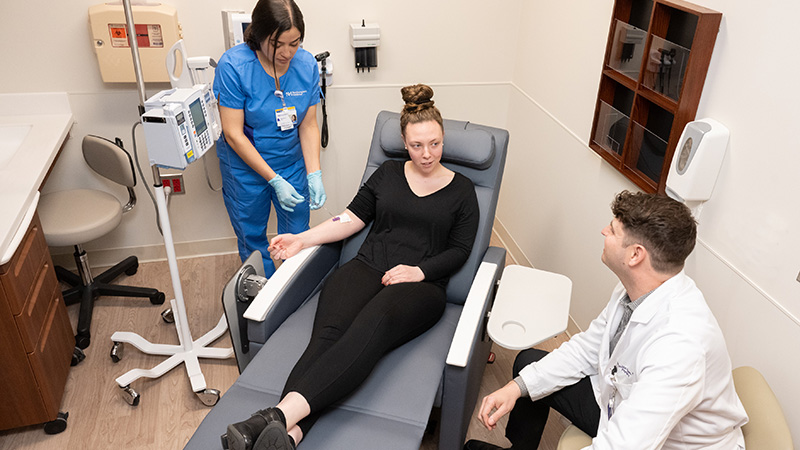Postpartum Depression and Beyond
A Guide to Perinatal Mood Disorders for Parents
Updated February 2023
Parenthood is a significant change to daily life, one that can seriously impact the emotional health of new parents. Perinatal mood disorders — the inclusive term for a number of conditions that affect parents after the birth of a child — impact as many as 30% of people who give birth. But neither parent is immune: In a recent Northwestern Medicine study on fatherhood, scientists noted a rise in postnatal depression in new dads.*
The parents' mental health will have an impact on the child.— Sheehan D. Fisher, PhD
"The way men express depression doesn't always fit the traditional model of depression," says Sheehan D. Fisher, PhD, a psychologist at Northwestern Medicine and one of the study scientists. "Therefore, once they are evaluated, they may not actually meet the criteria. Some criteria do not really fit the masculine cultural view about how to express emotion."
Fisher adds that men may use alcohol or exhibit aggressive behavior to mask or deal with their symptoms of depression or stress.
Perinatal mood disorders tend to develop in the first few months after childbirth, but can appear any time in the first two years. While there is no specific cause, some risk factors include sleep deprivation, isolation, hormonal changes and stressful events around the time of birth.
It's worth noting that after the birth of a child, mood swings alone are not cause for serious concern, nor are the "baby blues" — a brief, temporary moodiness that passes on its own within two weeks and affects nearly 80% of people after giving birth.
Types of Perinatal Mood Disorders
Postpartum Depression
Postpartum depression is the most well-known perinatal mood disorder. It's characterized by:
- Feelings of anger, sadness, irritability and guilt
- Lack of interest in the baby
- Changes in eating and sleeping habits
- Trouble concentrating
- Thoughts of hopelessness
Postpartum Anxiety
Extreme worries and fears, usually over the safety of the baby, are signs of postpartum anxiety. This may take the form of:
- Panic attacks
- Shortness of breath
- Chest pain
- Dizziness
- Feeling of losing control
- Numbness and tingling
Postpartum Obsessive-Compulsive Disorder
As the name suggests, this condition includes both obsessions (repetitive, upsetting thoughts or mental images) and compulsions (the need to do certain things to reduce anxiety).
Postpartum Post-traumatic Stress Disorder
A frightening or traumatic birth may cause this condition, in which you relive flashbacks with feelings of anxiety and feel the need to avoid things related to the event.
Postpartum Psychosis
Seeing or hearing images or voices that others cannot (hallucinating) is characteristic of postpartum psychosis. It can lead to belief in things that aren't true or distrust in others, as well as periods of confusion, memory loss and mania. Postpartum psychosis is the most severe perinatal mood disorder and can be dangerous. If you or someone you know appears to be suffering from postpartum psychosis, seek professional help immediately.
Symptom Check for Perinatal Mood Disorder
If you answer yes to any of the following questions, you should talk with a healthcare professional about perinatal mood disorders.
- Are you feeling sad or depressed?
- Do you feel more irritable or angry with those around you?
- Are you having difficulty bonding with your baby?
- Do you feel anxious or panicky?
- Are you having problems eating or sleeping?
- Do you have troubling thoughts that you can't get out of your mind?
- Do you feel as if you are "out of control" or "going crazy"?
- Do you feel like you never should have become a parent?
- Are you worried that you might hurt your baby or yourself?
How to Get Help
The first step to treating a perinatal mood disorder is recognizing that the symptoms are due to a treatable illness. Understanding that fact can provide tremendous relief and hope. Similarly, it's important that the family understands that no one is to blame for the situation, and they are not alone. Treatment can include individual or family therapy, support groups, and sometimes medication. Left untreated, perinatal mood disorders can damage the parent-child bond, and can lead to chronic mood disorders, marital trouble and child neglect.
"What we know is that the father and mother's mental health will have an impact on the child," says Fisher. "It can have an impact on the child's medical and mental health."
If you or someone you know is experiencing symptoms of a perinatal mood disorder, consult your physician or a Behavioral Health Services professional. You can also contact the Postpartum Support International helpline at 800.944.4773.
*Scientists do not always collect information from participants about gender identity. To avoid misrepresenting the results of this research, we use the same terminology as the study authors.






